将来时的六种表示法
表示将来时的几种常用法
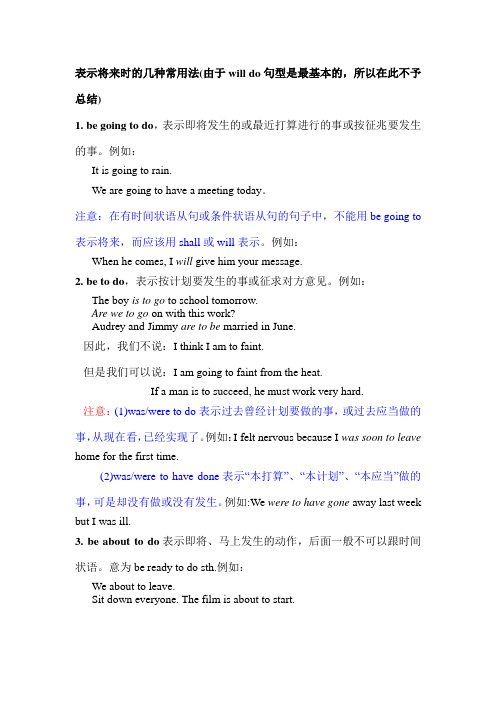
表示将来时的几种常用法(由于will do句型是最基本的,所以在此不予总结)1. be going to do,表示即将发生的或最近打算进行的事或按征兆要发生的事。
例如:It is going to rain.We are going to have a meeting today.注意:在有时间状语从句或条件状语从句的句子中,不能用be going to 表示将来,而应该用shall或will表示。
例如:When he comes, I will give him your message.2. be to do,表示按计划要发生的事或征求对方意见。
例如:The boy is to go to school tomorrow.Are we to go on with this work?Audrey and Jimmy are to be married in June.因此,我们不说:I think I am to faint.但是我们可以说:I am going to faint from the heat.If a man is to succeed, he must work very hard.注意:(1)was/were to do表示过去曾经计划要做的事,或过去应当做的事,从现在看,已经实现了。
例如:I felt nervous because I was soon to leave home for the first time.(2)was/were to have done表示“本打算”、“本计划”、“本应当”做的事,可是却没有做或没有发生。
例如:We were to have gone away last week but I was ill.3. be about to do表示即将、马上发生的动作,后面一般不可以跟时间状语。
意为be ready to do sth.例如:We about to leave.Sit down everyone. The film is about to start.4.特殊用法<1> 进行时表将来(适用于go, come, start, move, stay, leave, arrive等词),例如:I'm leaving for Beijing.<2> 一般现在时表将来(适用于go, come, start, get, stay, leave, arrive等词),例如:The meeting starts at five o'clock.He gets off at the next stop.[color=blue]我个人认为(有待老师的证实)[color]这种情况有表示计划好要做某事的意味。
将来时的六种表达法

将来时的六种表达法1.will/ shall do (will可用于第一、二、三人称,shall只用于第一人称)(1) 这种将来意义常常夹杂着情态意义,即带有说话人的主观态度和看法。
You will fail the test if you don’t work hard.(2) 有时既表示将来,也含有“意愿〞或“意图〞。
e.g. I will meet you at 6 o’clock.(3) 在疑问句中will/ shall还可用来征询听话人的“意图〞。
e.g. Will you be at home at seven this eveninge.g. --- Will you marry me --- Yes, I will.特别提示:1).will 可表示根据当时的情况,临时所做的打算。
e.g.-----Mr. Wang is ill in hospital. ----Oh, I’ll go and see him.e.g.-----Did you tell Julia about the result----- Oh,no,I forget.I_____ her nowA.will be callingB. will callC. callD. am to call2.)表单纯将来的will通常不用于时间,条件,让步状语从句,而是用一般现在时代替。
If 引导的条件状语从句中使用will不表将来,而表意愿。
e.g.I’ll tell him the truth if I see him tomorrow.e.g.1.If you will listen to me, I’ll tell you the truth. 2. If you __ for another ten minutes,Mr Brown will be here.A.will waitB.are going to waitC.are about to waitD.are waiting3) won’t 可表示拒绝做某事,用于物时,好似无生命的物体有了意志力。
将来时
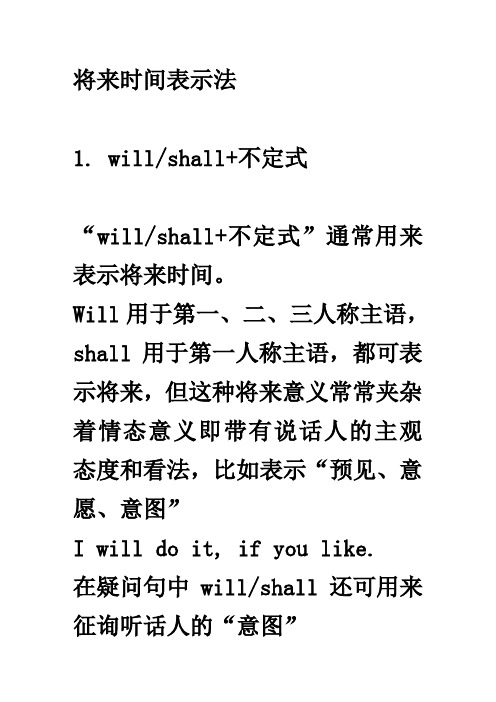
将来时间表示法1. will/shall+不定式“will/shall+不定式”通常用来表示将来时间。
Will用于第一、二、三人称主语,shall用于第一人称主语,都可表示将来,但这种将来意义常常夹杂着情态意义即带有说话人的主观态度和看法,比如表示“预见、意愿、意图”I will do it, if you like.在疑问句中will/shall还可用来征询听话人的“意图”When shall we see you next? 2. will/shall +不定式进行体/完成体既然“will/shall+不定式”往往夹杂着情态意义,如果我们要表示“纯粹”将来,便可采用“will/shall+不定式进行体”结构。
这种结构通常有“自然要发生”的含义,因而不包含“意愿”、“意图”等情态意义。
The train will be arriving at two o’clock.“Will/shall?+不定式进行体”结构也可以表示将来某一时刻或时段里正在进行的动作。
I’ll be working here during May. 如果要表示将来某一时刻之前也已完成的动作便可用“will/shall+不定式完成体”。
I will have finished my work by five this afternoon.如果要表示一个已经开始的动作到将来某一时间仍在进行,便可用“will/shall +不定式进行体”By the end of next month I shallhave been working here for 20 Years exactly.顺便提一下,“will+不定式进行体”,“will+不定式完成体”和“will+不定式完成进行体”结构在一定语境中也可能并不表示“将来”,而仅表示说话人的揣测。
It’s already six o’clock. He won’t be working now.(现已六点,他大概不会在工作。
将来时的几种表达方式

一般将来时的几种表达方式一般将来时表小将来某个时间要发生的动作或存在的状态,也表小将来经常或反复发生的动作,常与表示将来的时间状语连用。
例如:tomorrow , tomorrow morning / afternoon , , the day after tomorrow , next year , next month , , from now on (从现在开始),in an hour (一小时后),in two days / weeks,等。
一般将来时的表小方法有以下多种形式:(1)will/shall do表示将来时间时,一般要与表示将来的时间状语连用,或通过一定的上下文来体现将来时间状语。
shall只用丁第一人称,will可以通用丁各种人称。
在I可句中shall常用丁第一人称表示建议或征求对方意见。
例如:A. I shall write you a letter next month .我下个月给你写信。
B. He will come.他会来。
C. Shall we go to the park ?我们去公园好吗?注意:在You and I,或Both of us之后通常用will而不用shall,例:Both of us will be at the meeting tomorrow.明天我们俩都会出席会议。
⑵ will/shall be doing因为在will/shall do中的will/shall也可理解为情态动词,所以有时会难区分它们是将来意义还是情态意义。
在英语口语中我们常用will/shall be doing来表示“单纯的”将来时间。
比较下列句子:I will come tomorrow . Will you come ?我明天来!你来吗?(will 表示意图和请求)I will be coming tomorrow . Will you be coming ?我明天来,你来吗?(will 在句中单纯表小将来)这一结构还表示不久或势必要发生的动作,例:The train will be arriving soon. 火车彳艮快就至U站了。
将来时态的种种用法及几种时态区别
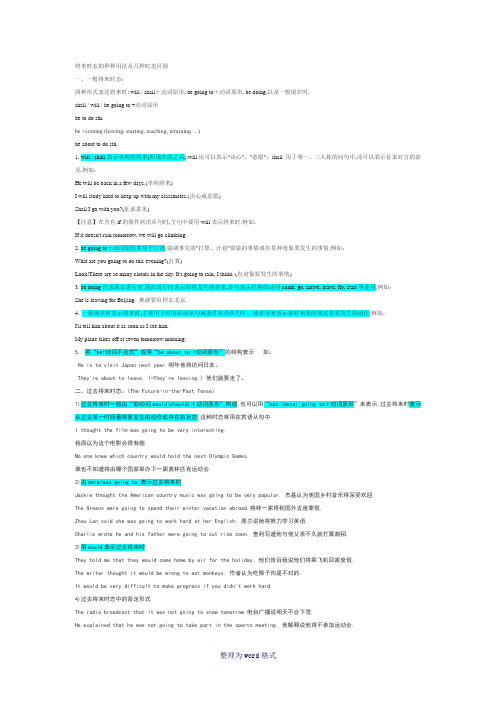
将来时态的种种用法及几种时态区别一、一般将来时态:四种形式表达将来时: will / shall+动词原形, be going to+动词原形, be doing,以及一般现在时.shall / will / be going to +动词原形be to do sth.be +coming (leaving, starting, reaching, returning….)be about to do sth.1. will / shall表示单纯的将来(即现在的之后),will还可以表示"决心"、"意愿";shall 用于第一、三人称的问句中,还可以表示征求对方的意见.例如:He will be back in a few days.(单纯将来)I will study hard to keep up with my classmates.(决心或意愿)Shall I go with you?(征求意见)【注意】在含有if的条件状语从句时,主句中要用will表示将来时.例如:If it doesn't rain tomorrow, we will go climbing.2. be going to+动词原形多用于口语,强调事先的"打算、计划"要做的事情或有某种迹象要发生的事情.例如:What are you going to do this evening?(打算)Look!There are so many clouds in the sky. It's going to rain, I think. (有迹象要发生的事情)3. be doing代表现在进行时.现在进行时表示即将发生的将来,多与表示位移的动词come, go, arrive, leave, fly, start等连用.例如:She is leaving for Beijing. 她就要启程去北京.4. 一般现在时表示将来时,主要用于时间状语从句或条件状语从句中;或者用来表示按时刻表的规定将要发生的动作.例如:I'll tell him about it as soon as I see him.My plane takes off at seven tomorrow morning.5.用“be+动词不定式”或用“be about to +动词原形”的结构表示如:He is to visit Japan next year.明年他将访问日本。
英语动词的将来时

英语动词的将来时摘要英语动词的将来时是用来表示将来某一时刻或某一段时间内发生的动作或状态,或者表示对将来的打算、预测、安排等。
英语动词的将来时有多种表达方式,主要有以下六种:will/shall + 动词原形be going to + 动词原形be + to + 动词原形be about to + 动词原形be + 现在分词一般现在时这六种表达方式有不同的含义和用法,需要根据语境和语气来选择合适的一种。
本文将分别介绍这六种表达方式的定义、结构、用法和例句,并用表格来对比它们的异同。
1. will/shall + 动词原形1.1 定义will/shall + 动词原形是一种最常用的表示将来时的方式,它可以表示即将发生的动作或状态,或者表示对将来的打算、意愿、决定、预测等。
1.2 结构will/shall + 动词原形的结构如下:人称肯定句否定句一般疑问句特殊疑问句第一人称单数I shall/will do I shall not/will not do Shall/Will I do?What shall/will I do?第二人称单数You will do You will not do Will you do?What will you do?第三人称单数He/She/It will do He/She/It will not do Will he/she/it do?What will he/she/it do?第一人称复数We shall/will do We shall not/will not do Shall/Will we do?What shall/will we do?第二人称复数You will do You will not do Will you do?What will you do?第三人称复数They will do They will not do Will they do?What will they do?1.3 用法will/shall + 动词原形的用法如下:表示即将发生的动作或状态,常与表示将来时间的状语连用,如 tomorrow, next week, in the future 等。
英语将来时的结构
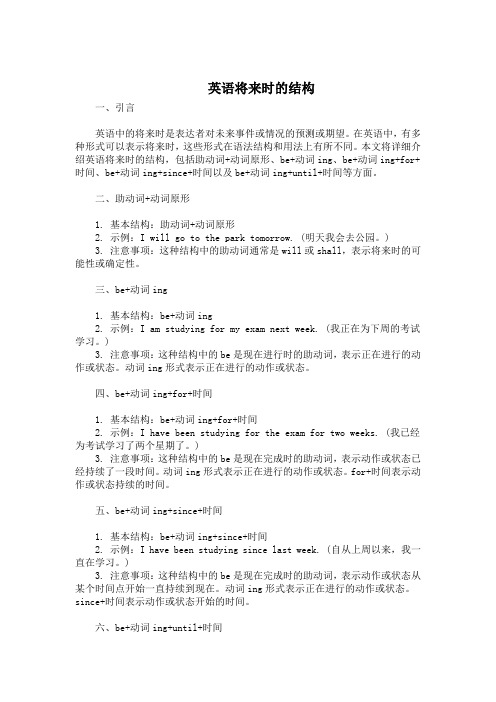
英语将来时的结构一、引言英语中的将来时是表达者对未来事件或情况的预测或期望。
在英语中,有多种形式可以表示将来时,这些形式在语法结构和用法上有所不同。
本文将详细介绍英语将来时的结构,包括助动词+动词原形、be+动词ing、be+动词ing+for+时间、be+动词ing+since+时间以及be+动词ing+until+时间等方面。
二、助动词+动词原形1. 基本结构:助动词+动词原形2. 示例:I will go to the park tomorrow. (明天我会去公园。
)3. 注意事项:这种结构中的助动词通常是will或shall,表示将来时的可能性或确定性。
三、be+动词ing1. 基本结构:be+动词ing2. 示例:I am studying for my exam next week. (我正在为下周的考试学习。
)3. 注意事项:这种结构中的be是现在进行时的助动词,表示正在进行的动作或状态。
动词ing形式表示正在进行的动作或状态。
四、be+动词ing+for+时间1. 基本结构:be+动词ing+for+时间2. 示例:I have been studying for the exam for two weeks. (我已经为考试学习了两个星期了。
)3. 注意事项:这种结构中的be是现在完成时的助动词,表示动作或状态已经持续了一段时间。
动词ing形式表示正在进行的动作或状态。
for+时间表示动作或状态持续的时间。
五、be+动词ing+since+时间1. 基本结构:be+动词ing+since+时间2. 示例:I have been studying since last week. (自从上周以来,我一直在学习。
)3. 注意事项:这种结构中的be是现在完成时的助动词,表示动作或状态从某个时间点开始一直持续到现在。
动词ing形式表示正在进行的动作或状态。
since+时间表示动作或状态开始的时间。
将来时基本用法
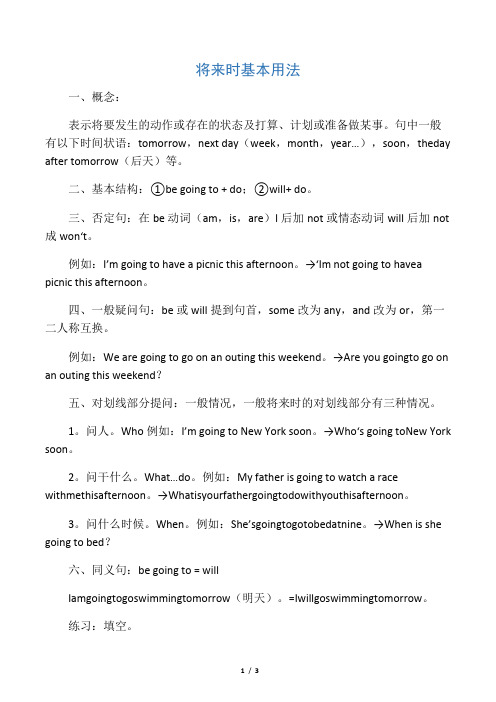
将来时基本用法一、概念:表示将要发生的动作或存在的状态及打算、计划或准备做某事。
句中一般有以下时间状语:tomorrow,next day(week,month,year…),soon,theday after tomorrow(后天)等。
二、基本结构:①be going to + do;②will+ do。
三、否定句:在be动词(am,is,are)l后加not或情态动词will后加not 成won‘t。
例如:I’m going to have a picnic this afternoon。
→‘Im not going to havea picnic this afternoon。
四、一般疑问句:be或will提到句首,some改为any,and改为or,第一二人称互换。
例如:We are going to go on an outing this weekend。
→Are you goingto go on an outing this weekend?五、对划线部分提问:一般情况,一般将来时的对划线部分有三种情况。
1。
问人。
Who例如:I’m going to New York soon。
→Who‘s going toNew York soon。
2。
问干什么。
What…do。
例如:My father is going to watch a race withmethisafternoon。
→Whatisyourfathergoingtodowithyouthisafternoon。
3。
问什么时候。
When。
例如:She’sgoingtogotobedatnine。
→When is she going to bed?六、同义句:be going to = willIamgoingtogoswimmingtomorrow(明天)。
=Iwillgoswimmingtomorrow。
练习:填空。
将来时的六种表示法

一般将来时的六种表示法一、will/shallwill/shall通常用来表示将来时间。
Will用于第一、二、三人称主语,shall用于第一人称主语,都可以表示将来时,但是这种意义通常夹杂着情态意义,即带有说话人的主观态度和看法,比如表示“预见”:You will feel better if you after taking this medicine.He won’t be here in time unless he comes by air.We shall know the result next week.I am sure that I shall not lose my way in the woods.有时候表示将来,也含有“意愿”或“意图”I will do it if you like it.As the railway is not yet open to traffic, we shall go by boat.I promised to pay him back in time, but he won’t lend it to me.二、be going to这一结构的主要意义,一是表示“意图”,即打算在将来做什么。
Are you going to post that letter by air mail?How long is he going to stay here? 由于没有语境的限制,也可以换成will。
We’re going to call a meeting to discuss it.意图的体现者通常是句子的主语,但也有可能不是。
如:He’s not going to cheat me again.(=I won’t let him cheat me again.)二是表示“预见”,即现在已有的迹象表明将要或即将发生某种情况。
如:I feel dizzy. I think I am going to faint.Good heavens! I must hurry. I’m going to be late.Look at that black clouds——there is going to be a storm.表“意图”的用法有时候可以与“will+do”互换使用,但是也要注意区分。
英语将来时的几种表达法分别是什么

英语将来时的几种表达法分别是什么一般将来时表示将来某个时间要发生的动作或存在的状态,也表示将来经常或反复发生的动作,常与表示将来的时间状语连用。
一般将来时的表示方法有多种形式。
例如:will / shall +动词原形;be going to+动词原形;be+v. ing;be to(be about to)+动词原形结构等。
英语将来时的几种表达法1英语将来时的表达法be going to +动词原形表示主语现在的意图或打算在最近将要做的事情。
shall/will + 动词原形shall 只能用于第一人称I/We, will可以用于任何人称,如果是You and I 作为主语时,也用will.值得注意的是:be going to 和will 略有不同,be going to 表示事先经过考虑的打算,而will多表示意愿、决心。
以下这个句子不能用will进行替换(详细的两者区别,下次再详述,这里不再赘述)be + to do(动词原形)主要表示按计划或安排将要做的事情。
be about to do(动词原形)表示就要做或者正好要做某事,后面也可与when 连用,暗示时间上的巧合。
be +doing (现在分词)某些表示趋向性的瞬间动词,如come,go ,leave,arrive,begin,start,stop,close,open,die,join,borrow,buy可以用进行时的形式来表示将来的概念,现在进行时表一般将来,过去进行时表过去将来。
2一般将来时标志性词汇tomorrow 明天the day after tomorrow 后天next week/year 下周、明年in the future 在将来the day after tomorrow 后天this evening/afternoon/ year今天晚上、今天下午、今年before long 不久以后next year/month/week/summer 明年、下个月、下星期、明年夏天in the future,some day 未来、将来的某一天in two weeks/days/years 两(周、天、年)后。
几种将来时间表示法的比较
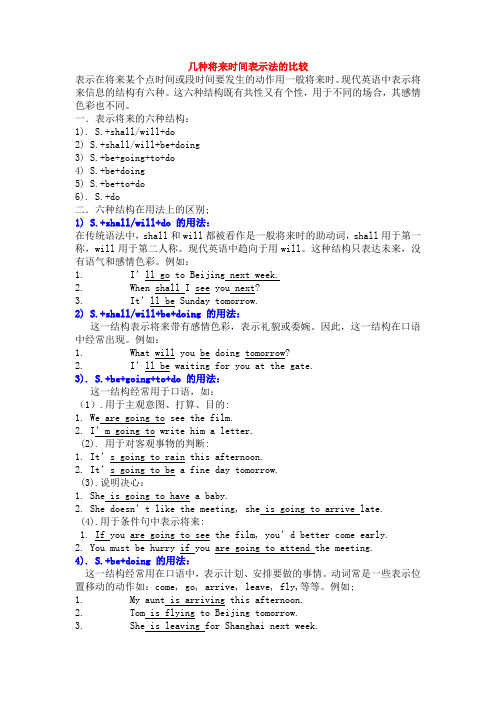
几种将来时间表示法的比较表示在将来某个点时间或段时间要发生的动作用一般将来时。
现代英语中表示将来信息的结构有六种。
这六种结构既有共性又有个性,用于不同的场合,其感情色彩也不同。
一.表示将来的六种结构:1). S.+shall/will+do2) S.+shall/will+be+doing3) S.+be+going+to+do4) S.+be+doing5) S.+be+to+do6). S.+do二.六种结构在用法上的区别;1) S.+shall/will+do 的用法:在传统语法中,shall和will都被看作是一般将来时的助动词,shall用于第一称,will用于第二人称。
现代英语中趋向于用will。
这种结构只表达未来,没有语气和感情色彩。
例如:1. I’ll go to Beijing next week.2. When shall I see you next?3. It’ll be Sunday tomorrow.2) S.+shall/will+be+doing 的用法:这一结构表示将来带有感情色彩,表示礼貌或委婉。
因此,这一结构在口语中经常出现。
例如:1. What will you be doing tomorrow?2. I’ll be waiting for you at the gate.3). S.+be+going+to+do 的用法:这一结构经常用于口语,如:(1).用于主观意图、打算、目的:1. We are going to see the film.2. I’m going to write him a letter.(2). 用于对客观事物的判断:1. It’s going to rain this afternoon.2. It’s going to be a fine day tomorrow.(3).说明决心:1. She is going to have a baby.2. She doesn’t like the meeting, she is going to arrive late.(4).用于条件句中表示将来:1. If you are going to see the film, you’d better come early.2. You must be hurry if you are going to attend the meeting.4). S.+be+doing 的用法:这一结构经常用在口语中,表示计划、安排要做的事情。
将来时的用法

将来时的用法将来时用来表示动作或状态将发生在现在以后的时间。
英语中有多种表示将来时的结构和形式,以下是常用的几种形式和用法:1. will/shall + 动词原形这是最常用的将来时表达方式,表示将来某个时间发生的动作或状态。
例句:- I will go to the beach tomorrow.(我明天会去海滩。
)- She will be here soon.(她马上就到。
)2. be going to + 动词原形这种形式表示根据当前情况,某个动作或状态几乎肯定会发生。
例句:- They are going to have a party next week.(他们下周要开个派对。
)- It looks like it's going to rain.(看起来要下雨了。
)3. 现在进行时将来时可以通过现在进行时来表示将要发生的动作。
例句:- I am meeting my friends for lunch tomorrow.(明天我要和朋友们吃午饭。
)- She is leaving on a business trip next week.(她下周要出差。
)4. 将来进行时表示将来某个时间正在进行的动作,需要用到will/shall be + 现在分词。
例句:- They will be studying for exams all night.(他们将会彻夜备考。
)- I shall be working late tomorrow.(明天我要工作到很晚。
)需要注意的是,对于一些固定的计划、安排或事实,如公共交通时间表、日程安排等,可以使用现在时来表示将来时间。
例如:The train leaves at 9 o'clock tomorrow.(明天九点火车开车。
)。
一般将来时的几种语法形式
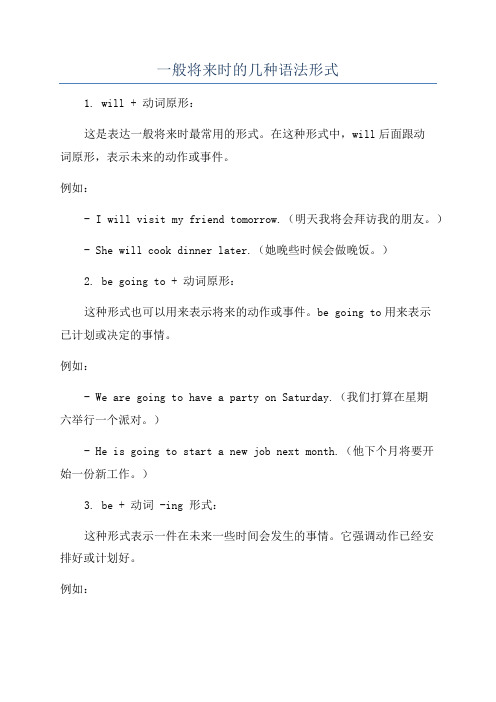
一般将来时的几种语法形式1. will + 动词原形:这是表达一般将来时最常用的形式。
在这种形式中,will后面跟动词原形,表示未来的动作或事件。
例如:- I will visit my friend tomorrow.(明天我将会拜访我的朋友。
)- She will cook dinner later.(她晚些时候会做晚饭。
)2. be going to + 动词原形:这种形式也可以用来表示将来的动作或事件。
be going to用来表示已计划或决定的事情。
例如:- We are going to have a party on Saturday.(我们打算在星期六举行一个派对。
)- He is going to start a new job next month.(他下个月将要开始一份新工作。
)3. be + 动词 -ing 形式:这种形式表示一件在未来一些时间会发生的事情。
它强调动作已经安排好或计划好。
例如:- They are traveling to Paris next week.(他们下周去巴黎旅行。
)- I am meeting my friends for lunch tomorrow.(明天我将与朋友们见面吃午饭。
)4. be about to + 动词原形:这种形式表示即将发生的事情,比如在不远的将来要发生的事情。
例如:- The movie is about to start.(电影即将开始。
)- She is about to graduate from university.(她即将大学毕业。
)5. be to + 动词原形:这种形式常用于官方通知、计划或安排。
它表示将要发生的事情是按照提前安排的程序进行。
例如:- The meeting is to be held tomorrow.(会议定于明天举行。
)- The train is to arrive at 9 o'clock.(火车将于9点钟到达。
六种常用一般将来时表示法
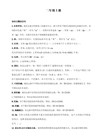
——No, he will not.不,他不会。
注意:在书面语中,主语是第一人称I(We)时,常用shall,即I(We)+shall+动词原形,也可用will。
例如:Shall we have any class tomorrow?明天我们有课吗?
——Yes,we will(we shall).是的,我们明天有课。
10. She_____(have)a concert the next year.
Keys:1、will…arrive 2、will be 3、am going to buy 4、are to 5、will not take
6、has, will go 7、come 8、returns, will let 9、will send, are 10、will have
一、常用表示法:
1、be going to+动词原形
表示将要发生的事,或打算、计划、决定要做的事情时,其肯定式:主语 + be + gong to do ;
疑问式:be + 主语 + gong to do ;否定式:主语 + be + gong to do。其中:be(am/is/are) 随主语人称而变化。
将来时的各种形式及例句整理

将来时的各种形式及例句整理将来时是英语中用来表示将来动作或状态的一种时态,包含了多种形式。
在本文中,将介绍将来时的各种形式并提供相应的例句。
一、一般将来时一般将来时表示将来某个时间会发生的动作或状态。
一般将来时的构成方式如下:1. 主语 + will + 动词原形2. 主语 + be going to + 动词原形以下是一些例句:1. I will go to the movies tomorrow.(我明天会去看电影。
)2. They are going to have a party next week.(他们下周要开派对。
)3. She will learn to play the piano.(她将学会弹钢琴。
)二、将来进行时将来进行时表示将来某一时刻正在进行的动作。
将来进行时的构成方式如下:1. 主语 + will be + 动词ing以下是一些例句:1. They will be watching a movie at this time tomorrow.(明天此时他们将在看电影。
)2. She will be working on her project tomorrow morning.(明天早上她将在进行项目工作。
)三、将来完成时将来完成时表示将来某一时刻之前已经完成的动作。
将来完成时的构成方式如下:1. 主语 + will have + 过去分词以下是一些例句:1. By the time he arrives, I will have finished my homework.(等他到达时,我将已经完成作业。
)2. They will have left for Paris by the end of this month.(到本月末,他们将已经去巴黎了。
)四、将来完成进行时将来完成进行时表示将来某一时刻之前已经开始并且一直在进行的动作。
将来完成进行时的构成方式如下:1. 主语 + will have been + 动词ing以下是一些例句:1. By the time they arrive, we will have been waiting for three hours.(等他们到达时,我们将已经等待了三个小时。
表将来时的七种形式

Christmas vacation.
A. be seen
B. have seen
C. be seeing
D. to see
11
2. ---I’m going to the States?
---How long ___ you___ in the States?
A. are; stayed B. are; staying
13
5. --- You’ve left the light on.
---Oh, I have. ___ and turn it off.
A. I go
B. I’ve gone
C. I’ll go
D. I’m going
6. --- Is this raincoat yours?
---No, mine____ there behind the door.
3
☆表将来时的六种形式-3
*be about to+动词原形,表示“不久就 要…”,不能与具体表示将来的时间状语连用, 可与when连用如: The film is about to begin. He is about to leave.
4
☆表将来时的六种形式-4
*一般现在时表示将来 (1) 动词be 的一般现在时态常用来表示将来。如:
9
☆表将来时的六种形式-7
将来进行时表示将来时will be doing: I will be flying over the Atlantic at the moment tomorrow.
10
练一练!
1.---Did you write to Grace last summer?
---No, but I'll ______ her over
论文-英语中“将来”的几种表达方式

英语中“将来”的几种表达方式聚焦中考活学活用在英语中,将来时有多种表达形式,为了帮助同学们更好地掌握它们用法,我们进行了分类总结。
那么,关于“将来”的表达方式主要有下面几种:一、一般将来时表示将来要发生的事。
常用shall/will+动词原形构成。
shall 用于第一人称,用于陈述句,可用will 替代;用于疑问句,征询对方意见。
will 在陈述句中用于各种人称,在征求意见时,常用于第二人称。
例:I shall /will go to the Great Wall tomorrow.我们明天要去游长城。
You will have time for it.你会有时间做这件事的。
She will be here in a minute.她一会就来这儿。
Where shall we go for the May Day?五一节我们去哪呢?Will you be here at eight on Monday morning?你星期一上午八点到这儿好吗?二、be going to 结构,表示计划好、安排好、将要发生的事。
例:What are you going to do this weekend?这个周末你打算干什么?They are going to buy a new house next month.他们下个月要买新房子。
Look at the dark clouds,there is going to be a storm.看那些乌云,天要下雨了。
三、be +不定式表将来,按计划或正式安排将发生的事。
例:We are to discuss the report next Friday.下个星期五我们要讨论这个报告。
She is to be married next year.她明年要结婚了。
Who is to play Victoria?谁来扮演维多利亚?四、be about to +不定式,意为马上要做的事或马上要发生的事,此句式一般不跟明确表示将来的时间状语。
将来时6种表达方式的区别

—般将来时6种表达方式的区别1. be going to +动词原形结构的用法(1)这种结构表示打算在最近或将来要做某事(表明自己的意图),主语通常指人。
常用于口语当中。
例如:A. What are you going to do next Sunday? 下星期天你打算干什么?B. She ' s going to be a teacher. 她打算当一名教师。
(2)表示说话人根据已有的迹象认为很可能即将发生某事。
这时主语既可指人也可指物,此结构往往表示客观事态的发展,例如:A. Look at these black clouds. —It ' s going to rain. 看这些乌云。
天快要下雨了。
B. I ' m afraid I ' m going to have a bad cold. 恐怕我要得重感冒。
2. will / shall +动词原形结构的用法表示将来的动作或状态。
常用于书面语和正式文告中。
常与表示将来的时间状语连用。
表示说话者认为或相信要发生某事。
或表示“询问对方是否愿意”以及表示“客气的邀请”。
在问句中shall常用于第一人称表示建议或征求对方意见。
例如:A. I shall/ will write you a letter next month.我下个月给你写信。
B.I 'm sure he 'll be back in an hour. 我确信他一小时后会回来。
C. Shall we go to the park? 我们去公园好吗?D. Will you lend me the book? 你能把那本书借给我吗?3. be +动词不定式结构的用法这种结构着重指按计划或安排将要发生某事,即人们的意志所能控制。
常表示“职责、意图、约定、可能性”等。
A. We are to meet at the zoo. 我们约定在动物园见面。
将来时态的使用方法

5、 be going to+不定式
“be going to+不定式”的另一意义是表达说话人对可能性的预见,即现在已经有迹象表 明将要发生或即将发生某种情况。例如: ① A: The ceiling in this room doesn't look very safe, does it? B: No, it looks as if it is going to fall down. ② I feel terrible. I think I'm going to be sick. “will+不定式”和“be goingto+不定式”在表达“预见”时的区别主要在于:be going to结构暗示 有迹象表明某事件即将发生,而will 结构则表示作者认为或相信某事即将发生。
6、 现在进行体
现在进行体表示根据计划或安排将要发生的动作。当动词为go,come,leave, start, arrive,visit 等时,我们通常用现在进行体而不用be going to 结构。例如: They are going to Madrid(马德里) next Sunday. Mary is leaving the day after tomorrow. Ian isn't playing football on Saturday. He's hurt his leg. I'm not working tomorrow, so we can go out somewhere.
B: Yes, I know. I _______ (clean) them later. (5) I’ve decided not to stay here any longer. Tomorrow I ______ (look) for somewhere else to stay. (6) Don’t worry about your exam. I’m sure you _____ (pass).
英语中“将来时间”的几种表示法

英语中“将来时间”的几种表示法王慧敏;梁红【期刊名称】《大学英语》【年(卷),期】2000(000)008【摘要】现代英语中表示将来时间的语法手段很多,有时令我们感到无所适从,难以驾驭。
其实,在众多的表达将来动作的结构中,归结起来最常用的有六种,它们分别是:will/shall+v.;begoingto+v;be+V-ing;用一般现在时表示将来时间的动作;be+to+v.;beaboutto+v。
正确使用它们,对我们准确表达自己的意图大有裨益。
下面就这六种表达方法在不同语境下的使用进行分析比较。
一、六种表示方法的基本使用原则1.Will/shall+v.这种结构在将来时为表示法中最为常用,它可以表示纯粹将来时间发生的动作、或对将发生的动作作出预测和意测。
1)表示纯粹将来时间主要用于下面这类谈论日期或时间的句子中:① A:youwillbetwelvenextyear明年你就十二岁了。
B:Nonsense!shallbefourteen.胡说!十四岁了。
③ TomorrowwillbeSunday.明天是星期天。
与haveto和beableto这类含有情态意义的短语连用,通常表示纯粹将来时。
例如:① I’llbeabletogot...【总页数】3页(P)【作者】王慧敏;梁红【作者单位】【正文语种】中文【中图分类】H314【相关文献】1.英语将来时间表示法 [J], 张芳2.英语中“强调”的几种表示法 [J], 袁力3.英语中“输”、“赢”的几种表示法 [J], 蔡琼4.英语将来时间表示法 [J], 张芳5.英语动词将来时几种表示法 [J], 乔继华因版权原因,仅展示原文概要,查看原文内容请购买。
- 1、下载文档前请自行甄别文档内容的完整性,平台不提供额外的编辑、内容补充、找答案等附加服务。
- 2、"仅部分预览"的文档,不可在线预览部分如存在完整性等问题,可反馈申请退款(可完整预览的文档不适用该条件!)。
- 3、如文档侵犯您的权益,请联系客服反馈,我们会尽快为您处理(人工客服工作时间:9:00-18:30)。
一般将来时的六种表示法
一、will/shall
will/shall通常用来表示将来时间。
Will用于第一、二、三人称主语,shall用于第一人称主语,都可以表示将来时,但是这种意义通常夹杂着情态意义,即带有说话人的主观态度和看法,比如表示“预见”:
You will feel better if you after taking this medicine.
He won’t be here in time unless he comes by air.
We shall know the result next week.
I am sure that I shall not lose my way in the woods.
有时候表示将来,也含有“意愿”或“意图”
I will do it if you like it.
As the railway is not yet open to traffic, we shall go by boat.
I promised to pay him back in time, but he won’t lend it to me.
二、be going to
这一结构的主要意义,一是表示“意图”,即打算在将来做什么。
Are you going to post that letter by air mail?
How long is he going to stay here? 由于没有语境的限制,也可以换成will。
We’re going to call a meeting to discuss it.
意图的体现者通常是句子的主语,但也有可能不是。
如:
He’s not going to cheat me again.(=I won’t let him cheat me again.)
二是表示“预见”,即现在已有的迹象表明将要或即将发生某种情况。
如:
I feel dizzy. I think I am going to faint.
Good heavens! I must hurry. I’m going to be late.
Look at that black clouds——there is going to be a storm.
表“意图”的用法有时候可以与“will+do”互换使用,但是也要注意区分。
Be going to do表示的是说话之前就已经决定了,而“will+do”则是说话时临时想到的。
A: What a terrible box!
B: I will help you to carry it.(这里不能换为am going to)
A: why are you taking your stuffs out of the box?
B: I am going to carry this box to other place but it is too heavy. So I have to take something out. (这里不能用will)
三、be+-ing(现在进行体)
一是表示与他人约定或安排于最近要进行什么事,通常带有将来时间状语。
I am meeting Mary tonight. She is taking me to the movies.
He is having dinner with Ann on Friday.
Alex is getting married next month.
二是一些表示位置转移的动词,如come,go,start,arrive,stay,leave等,常常用现在进行时代替be going to do,表示主语单方面所决定的未来行为。
如:
I’m leaving tomorrow. 明天我要离开。
Are you staying here till next week?
A: Summer holiday is coming. Where are you going?
B: I am going to Australia.
四、be to
这一结构的主要用法,一是表示按计划、安排即将发生的动作。
这种用法比较正式,常见于报纸和广播,用于宣传官方的计划或决定。
例如:
I am to have tea with Betty this afternoon.
There is to be an investigation.
Where are we to stay tonight?
二是表示命令、禁止或可能性等。
如:
You are to stand here. Do you understand?
Tell her she’s not to be back late.
The dictionary is not to be had here.
五、一般现在时
一般现在时表示将来时间,常见于条件状语或时间状语从句中。
If he comes, I will let you know.
I’ll give it to you after I finish it.
Will 表意愿、意志的时候也可以放在条件状语从句中。
如:
If you will listen to me, I’ll be able to help you.
I will tell you if you will not tell anyone.
在主语中用一般现在时表示将来时间通常是表示有标记的极其明确的将来或描述的不能更改的将来事件或预定活动,如时间表、日程表、形式里所规定的将来活动。
Tomorrow is Saturday.
The summer holiday starts on June 28.
The plane takes off at 20:30 tonight.
注意:表示将来时间,一般现在时和现在进行时都有表示位移的动词连用,而且都有计划、安排的含义。
但是现在时所暗含的计划比较客观,因而具有不可变更性,而且用现在时表示将来在口气上也比较正式。
I’m leaving tomorrow.(个人的主观意愿)
The plane takes off at 20:30 tonight.(时间表上的规定)
六、be about to
即将发生的动作,指眼皮底下就要发生的事情,一般是不跟时间状语的。
Look, the train is about to leave!。
